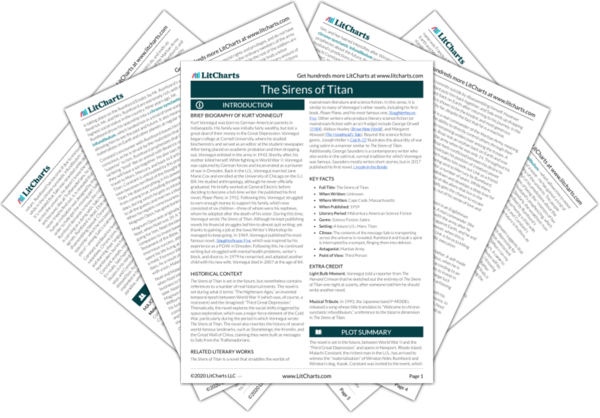Mankind flung its advance agents ever outward, ever outward […]
These unhappy agents found what had already been found in abundance on Earth—a nightmare of meaninglessness without end.

Unlock explanations and citation info for this and every other The Sirens of Titan quote.
Plus so much more...
Get LitCharts A+The moral: Money, position, health, handsomeness, and talent aren’t everything.
“When I ran my space ship into the chrono-synclastic infundibulum, it came to me in a flash that everything that has been always will be, and everything that ever will be always has been.” He chuckled again. “Knowing that rather takes the glamour out of fortunetelling—makes it the simplest, most obvious thing imaginable.”
The discovery of the chrono-synclastic infundibula said to mankind in effect: “What makes you think you’re going anywhere?”
It was a situation made to order for American fundamentalist preachers. They were quicker than philosophers or historians or anybody to talk sense about the truncated Age of Space.

There was something pathetic and repellent about Malachi Constant’s talking business. It has been the same with his father. Old Noel Constant had never known anything about business, and neither had his son—and what little charm the Constants had evaporated the instant they pretended that their successes depended on their knowing their elbows from third base.
His system was so idiotically simple that some people can’t understand it, no matter how often it is explained. The people who can’t understand it are people who have to believe, for their own peace of mind, that tremendous wealth can be produced only by tremendous cleverness.
Evangelist Bobby Denton’s image of Earth as God’s space ship was an apt one—particularly with reference to barflies. Helmholtz and Miss Wiley were behaving like pilot and co-pilot of an enormously pointless voyage through space that was expected to take forever.
At the hospital they even had to explain to Unk that there was a radio antenna under the crown of his skull, and that it would hurt him whenever he did something a good soldier wouldn’t ever do. The antenna also would give him orders and furnish drum music to march to. They said that not just Unk but everybody had an antenna like that—doctors and nurses and four-star generals included. It was a very democratic army, they said.
As free as it wanted to be—that’s how free the free will of Boaz was.
[…] he was too good a soldier to go around asking questions, trying to round out his knowledge.
A soldier’s knowledge wasn’t supposed to be round.
(71.) Unk, old friend—almost everything I know for sure has come from fighting the pain from my antenna […] Whenever I start to turn my head and look at something, and the pain comes, I keep turning my head anyway, because I know I am going to see something I’m not supposed to see. Whenever I ask a question, and the pain comes, I know I have asked a really good question […] The more pain I train myself to stand, the more I learn. You are afraid of the pain now, Unk, but you won’t learn anything if you don’t invite the pain. And the more you learn, the gladder you will be to stand the pain.
“Luck, good or bad,” said Rumfoord up in his treetop, is not the hand of God.”
“Luck,” said Rumfoord up in his treetop, is the way the wind swirls and the dust settles eons after God has passed by.”
Salo did not question the good sense of his errand, since he was, like all Tralfamadorians, a machine. As a machine, he had to do what he was supposed to do.
Once upon a time on Tralfamadore there were creatures who weren’t anything like machines. They weren’t dependable. They weren’t efficient. They weren’t predictable. They weren’t durable. And these poor creatures were obsessed by the idea that everything that existed had to have a purpose, and that some purposes were higher than others.
These creatures spent most of their time trying to find out what their purpose was. And every time they found out what seemed to be a purpose of themselves, the purpose seemed so low that the creatures were filled with disgust and shame.
“There it is—friend,” he said to his memory of Rumfoord, “and much consolation may it give you, Skip. Much pain it cost your old friend Salo. In order to give it to you—even too late—your old friend Salo had to make war against the core of his being, against the very nature of being a machine.
“You asked the impossible of a machine,” said Salo, “and the machine complied.”
Chrono had always known that his good-luck piece had extraordinary powers and extraordinary meanings.
And he had always suspected that some superior creature would eventually come to claim the good-luck piece as his own. It was the nature of truly effective good-luck pieces that human beings never really owned them.











